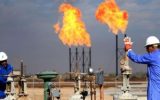
A member of the Energy Commission of the Islamic Consultative Assembly said: "Statistics show that the collection of gases associated with oil in the first year of the 14th government's activity and the implementation of the Seventh Development Plan has been one of the active and successful sectors of the Ministry of Oil."

The Director of Integrated Planning at the National Iranian Oil Company, emphasizing the strategic importance of the Dehloran pressure boosting station in the west of the country, said: "With the operation of this station and before the summer of next year, all the gases that can be collected in the west of the country will be completely returned to the consumption cycle."

The CEO of the National Iranian Gas Company announced: Natural gas storage capacity will double with the implementation of development projects in the Sarajeh and Shurijeh reservoirs.

On February 19, the household, commercial, and small industrial sectors consumed 69.5 percent of the total natural gas delivered to the national grid.

The CEO of the Iranian Gas Transmission Company considered the transfer of 886 million cubic meters of sweet gas on February 17 a new record in the history of the country's nationwide gas network, and said: "Relying on technical measures and the round-the-clock efforts of employees, gas transfer during peak winter consumption has been carried out without interruption and with maximum network capacity."

The CEO of Tehran Province Gas Company said: "Studies indicate that in Tehran Province, about 11 percent of gas is consumed by subscribers, and a total of 551 villages are covered by gas supply."

On February 17, the household, commercial, and small industrial sectors consumed 66 percent of the total natural gas delivered to the national grid.

Household, commercial, and industrial gas consumption on the seventh day of Bahman reached 672 million cubic meters, equivalent to 77 percent of the total gas injected into the national network.

The Deputy Director of Operational Efficiency at the National Efficiency Organization of Iran, emphasizing the strategic role of the gas collection from flare stacks project in enhancing the efficiency of the country's energy supply chain, considered this project as one of the most important national projects and a driver efficiency.

The production manager of the National Oil and Gas Company of Southern Iran, explaining the latest production status and gas collection from associated petroleum gases, announced a significant reduction in gas flaring in recent years and favorable progress in comprehensive gas collection projects.










